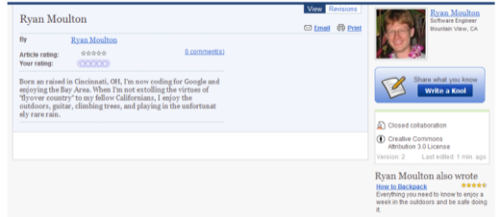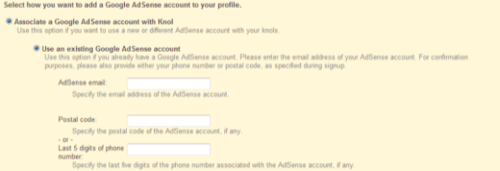Google just opened upKnol, its Wikipedia competitor, to the public after announcing a private beta of the service last December. Unlike Wikipedia, Knol puts a stronger emphasis on authorship and even encourages users to start different ‘knols’ for the same subject. Google is also serving up AdSense advertising on the site, whereas Wikipedia stays away from any advertising on its site.

In many respects, Knol is similar to Jason Calacanis’ Mahalo, though its scope seems even more ambitious and its tools a bit more refined. It does, however, validate the Mahalo model.
Authorship/Identity
Knol puts a lot of emphasis on authorship and, somewhat akin to Amazon’s “Real Name” scheme, authors can validate their identity on Knol through either a credit card or phone number.

The default setting for every Knol is “moderated collaboration.” In this mode, anybody with a Google account can suggest changes to an knol, but the author has to accept these changes before they go live.
Authors can also invite others to contribute to their articles and given them the same rights as the original author.
There is also an option for authors to write a short bio of themselves in Knol. While this is interesting here, it will be even more interesting to see if Google might start sharing these Knol identities (and maybe even the users’ reputation) among more of its properties.
Usage
Setting up a Knol is as easy as clicking the “Write a Knol” button. The text editor, too, is pretty straightforward, especially in the face of the often cryptic mark-up language most wikis use.
Knol uses a rich text editor, which presents users with all the typical editing functions, including basic formatting options, links (all set to ‘nonfollow’), and the ability to add references.

As of now, you can not embed any videos or other content, except for the New Yorker Cartoons that Google incensed for this project for reasons only Google knows.
Users who don’t want to write their own articles can review and rate knols. There is also an option to leave comments on every knol.
Creative Commons
Users can choose between three licenses for their articles, the Creative Commons Attribution License, the Creative Commons Attribution-Noncommercial License, and an “All Rights Reserved” license. The Attribution license is the default setting. Users can chose a different license for every knol.
Advertising
Authors on Knol can enter their AdSense data into Knol. Besides the cut Google already takes from the advertising through AdSense anyway, authors will get the regular AdSense payout for every click on an ad. This seems like a smart way to reward users who write the best (or most popular) content, while still making money for Google.
In the competition with Wikipedia, this might mean that some authors could divert their attention from editing Wikipedia articles to Knol. However, the question will also be if spammers can find a way of abusing this.

New Yorker Cartoons?
While there is no option to embed any videos or other content into the site, authors can embed cartoons from the New Yorker. This is done through a rather cumbersome process where users have to first search for a cartoon in the New Yorker store and then enter the ID number of the cartoon into Knol. Why Google chose the New Yorker’s cartoon archive for this is anybody’s guess, but chances are that Google will announce more content partnerships in the near future.
Is Google Going After Wikipedia?
Given how often Wikipedia results appear as Google’s top results, it would make sense for Google to look at this and decide to start its own competitor. By incentivizing authors through AdSense and by giving its users simple, but powerful tools to start their articles, Google might just be on the right track. While Google keeps reiterating that Knol is not meant to compete with Wikipedia, it’s hard to see how that wouldn’t be the case.
Knol, of course, has far fewer articles now than Wikipedia, but as it grows, it will be interesting to watch if Google is going to give preference to its own pages over the Wikipedia results. After all, Knol carries Google advertising and Wikipedia doesn’t, so Google would clearly have an incentive in doing so, though the potential public outcry if Google would try to do this might prevent them from even attempting it.










